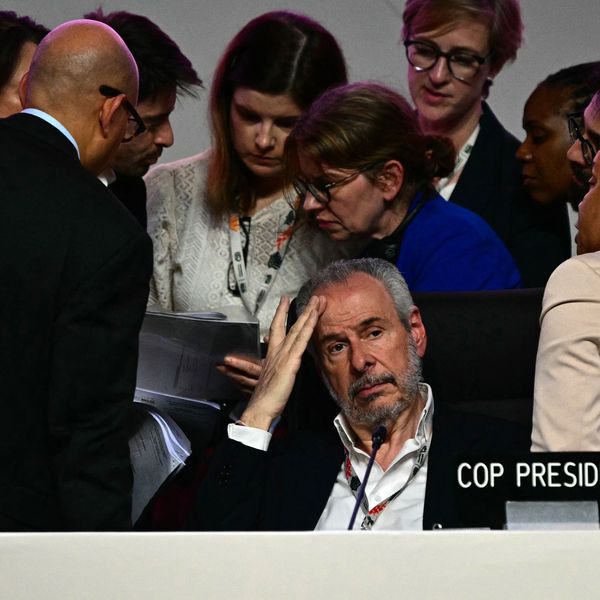Hundreds of activists from over 15 Arab countries took to the streets of
Qatar this weekend demanding their leaders do their part in reducing greenhouse gases, as the second week of the COP18 climate conference marches on.
With the first-ever Middle East-hosted climate negotiations as their platform, activists from across the Arab world called for urgent climate action, asking their leaders to submit voluntary pledges for emission mitigation targets and concrete steps towards a binding future agreement in Doha and a second commitment of Kyoto protocol to start in 2013, IndyACT reports.
"We only have one environment and one Earth, as the ministers and decision makers are coming, we need them to hear civil society voices and push for concrete steps they are willing to take whether it is committing to cutting their emissions or ensuring poorer countries get support to take action," said Ali Fakhry, media campaigner for IndyACT, an international group of independent environmental, social and cultural activists.
As Saturday's marchers demanded more action and accountability, conference negotiators continue to evade commitment and accountability for global warming.
Ministers from more than 100 developing countries--led by the Alliance of Small Island States, the Least Developed Countries block and the African Group of Nations--have stepped up and are asking for rich nations to take responsibility for their significant contribution to climate change in the form of compensation or "rehabilitation" to more vulnerable nations.
The idea is simple: developed nations who have contributed the most greenhouse gas emissions are most responsible for global warming and thus should provide compensation to their less-polluting neighbors, whose population and landscapes are often most vulnerable to the effects of climate change.
Whereas previously, wealthy nations were asked to provide assistance to poorer countries to help them adapt to climate change-- in the form of water sharing programs in Bhutan or new sources of income for farmers in Gambia--as the impacts of global warming have become more severe wreaking havoc on many developing nations, countries asking specifically for "loss and damage" compensation.
The Guardian writes:
The concept is new for both science and policy, say observers. In the past, the debate was about how poorer countries could adapt their economies to climate change and reduce, or mitigate, their emissions with assistance from rich countries.
But in a little-noticed paragraph in the agreement that came out of the Cancun, Mexico, talks in 2010, the need "to reduce loss and damage associated with climate change" was recognized by all countries. In legal terms, that potentially opens the door to compensation.
"We have transcended the era of mitigation and adaptation - this is now the new era of loss and damage. To rectify and redress the situation, developed countries have an urgent legal and moral obligation to undertake urgent and dramatic mitigation action," says a new publication (pdf) put forth by CARE, ActionAid and WWF.
The notion that rich nations should compensate for losses stemmed by global warming in developing countries is strongly resisted by both the US and Europe.
In light of their refusal to commit any funds for rehabilitation, a timely new analysis (pdf) by advocacy groupOil Change International, found that "fossil fuel subsidies in rich countries are, on average, five times greater than those same countries' pledges towards climate finance--support to developing countries to address climate change and its impacts."
"We need technical assistance and we need to think about financial assistance. [...] This is part of the negotiating process. We hope it will be part of the Doha outcome," said East Timor diplomat, Adao Soares.



